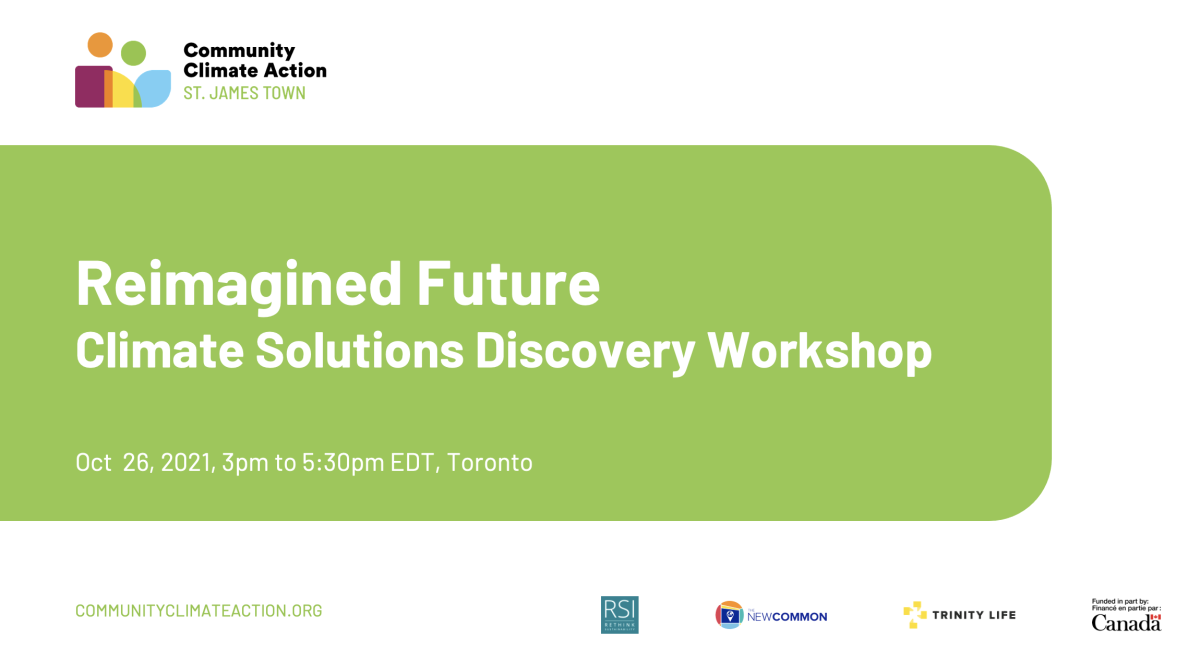On October 26 Community Climate Action hosted the second of a two-part workshop co-facilitated by Project Lead Yasmin Glanville and Facilitator Wen Li. These workshops help empower people to develop scalable solutions to manage the escalating threat of climate change on high-rise communities like St. James Town in Toronto. Learn more about the first workshop.
Teams are developing “resiliency hubs” to address and plan for Food, Shelter, Energy, Jobs, Emergency Preparedness and Connectivity. This workshop’s expert panellists:
- Vivian Patel, JLL Urban Planner – Planning and Development Expert
- Kirk Johnson, CCA-SJT Climate Ambassador Lead – Emergency Preparedness and Energy-Buildings Expert
- Rania Younes, Immigrant Employment Councils of Canada at IEC-BC – Newcomers and Young Professionals Workforce Expert
- Lisa Annabel Ellis, CCA Project Manager – Finance and Risk Management Expert
- Dr. Michael Seaman, Trinity Life/New Common, CAA Project Partner – Community Empowerment Expert

Reimagine the Future
Yasmin explained how CCA is starting at the community level because if solutions are too broad, nothing tends to happen. If they’re too narrow they end up in silos. Diversity and inclusion are key to solving major issues that affect broad communities, and climate change is happening now.
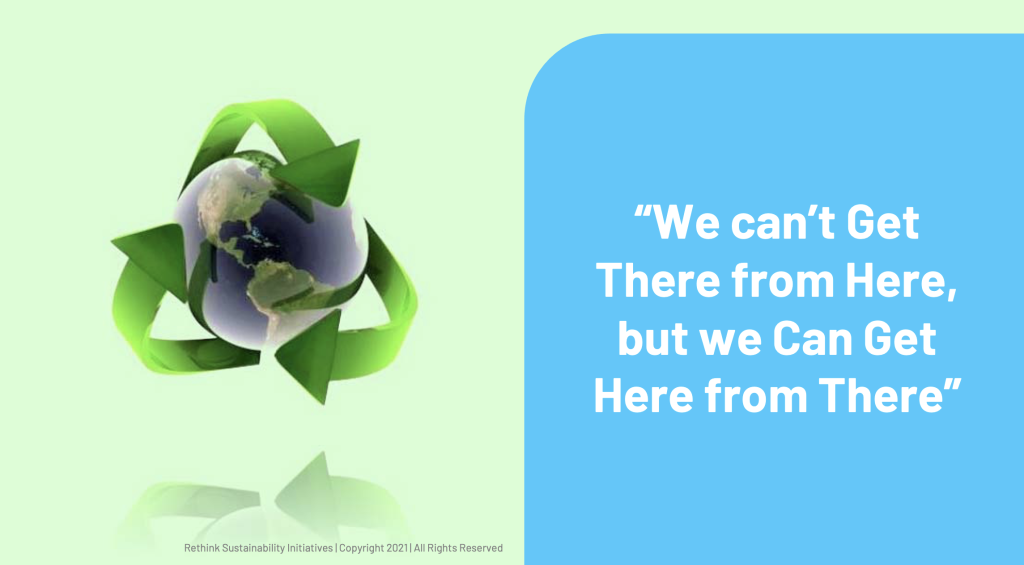
As in the first workshop, we welcomed guest speakers to provide some insight and inspiration around how they are working to address climate change and connect this to communities like SJT.
Speaker: Mark Rabin, Founder & CEO, Portable Electric
Climate Impacts on Energy and Proven solutions for portable, emission-free and reliable power when and where you need it.
Mark spoke about the impact of climate change on energy infrastructure. He gave examples of how cleantech companies have helped distressed communities, including a children’s village in Guatemala and post-hurricane North Carolina.
Moving large populations around due to the impacts of climate change is going to be an ongoing challenge. Infrastructure that is mobile, quick to deploy, scalable and which regenerates quickly is needed. Mark related this to a water pipe break in St. James Town in 2019 that shut down utilities in one building for weeks. This left a lot of people vulnerable during winter, with nowhere to go. The situation was compounded by the COVID-19 pandemic.
New Possibilities
Mark shared inspiring possibilities of bringing small and mobile sources of power in such situations. He shared ideas and images of mobile and scalable infrastructure that could be deployed in local community spaces like football fields to act as housing, medical units or workspace — there are many possibilities.
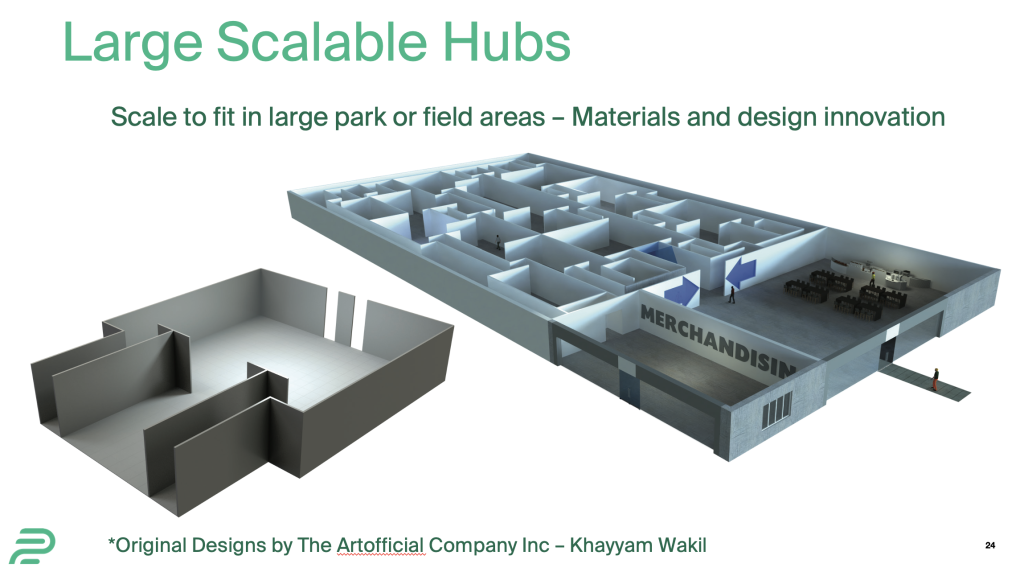
Organize and Innovate
A current roadblock to developing plans for resiliency is different groups working in silos. Successful development requires public and private partnerships at every level, with community collaboration and self-organized response teams. St. James Town has the potential to create a replicable model of innovation in clean mobile infrastructure and communication platforms for other communities. Innovation takes time and requires working through several ideas. The key is to get it started and to avoid scrambling.
Speaker: Fiona Oliver-Glasford, Sasol Inc. VP, Low Carbon Energy Solutions
Fiona presented how each person can harness their unique power to contribute to workforce development.
Research, follow the experts, look beyond people with who you share opinions to gain a broader perspective. Understand what key change agents your industry is advocating. What are your skills and what experience can you draw from? What is your passion?
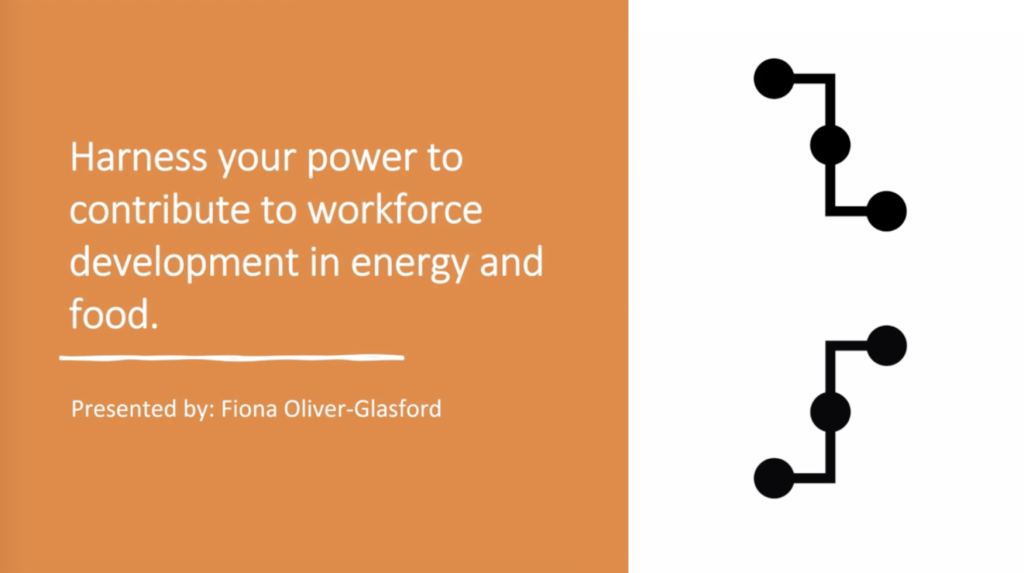
Fiona advised everyone to prepare an elevator pitch, embrace networking, build a presence around what they want to be known for. Online and offline, everyone you come in contact with has the potential to impact your career path.
Green jobs are a hot area right now, including many opportunities relevant to the resiliency hubs at St. James Town. Match a market need or gap to your value. Today many of those needs centre around sustainability.

Fiona also shared wisdom from Jane Goodall about how thinking globally can feel overwhelming. Projects and initiatives like those being developed at St. James Town show there is a lot of need and therefore opportunity at the local level. Getting involved in these projects in turn provides great experience to apply toward a career in the environmental sector.
Solutions Discovery Pitches and Open Dialogue
Building and Community Resilience in St. James Town
Resilience is the ability to respond satisfactorily to disturbances to various human needs. Peer Leader Julia Baranovsky touched on the incident in 2019 that left residents vulnerable. The group presenter outlined the project scope meant to be completed by 2023, broken into four phases. This includes an emergency preparedness plan and low-carbon resiliency roadmap, setting out relationships, stages, roles and responsibilities.
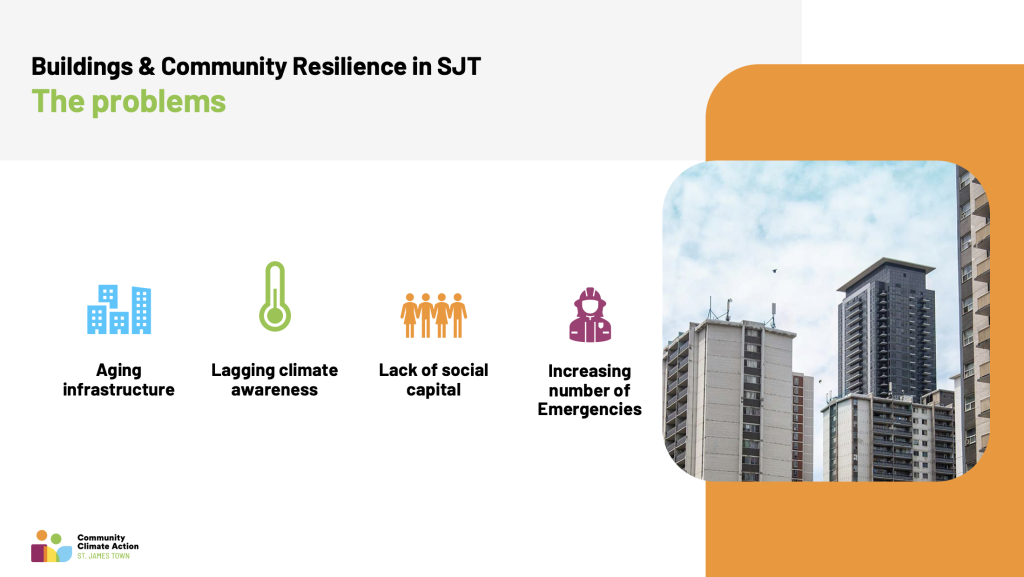
This group also outlined key metrics to help keep the project on track. They were able to look at similar projects from across North America for inspiration and successful examples. They wrapped up with next steps.
Local Food for SJT Pilot Project
Presented by Peer Leader Selvajayan (Selva) Vijayarangan, this team proposed solutions for food challenges in St. James Town. The ideal would be accessible, affordable and locally grown food for the community. Selva presented known challenges such as the dense population, limited retail options and little access to farmers’ markets and festivals, which create low access to healthier choices. The first step is understanding impediments faced by residents to accessing better options and by retailers and farmers to provide this food.
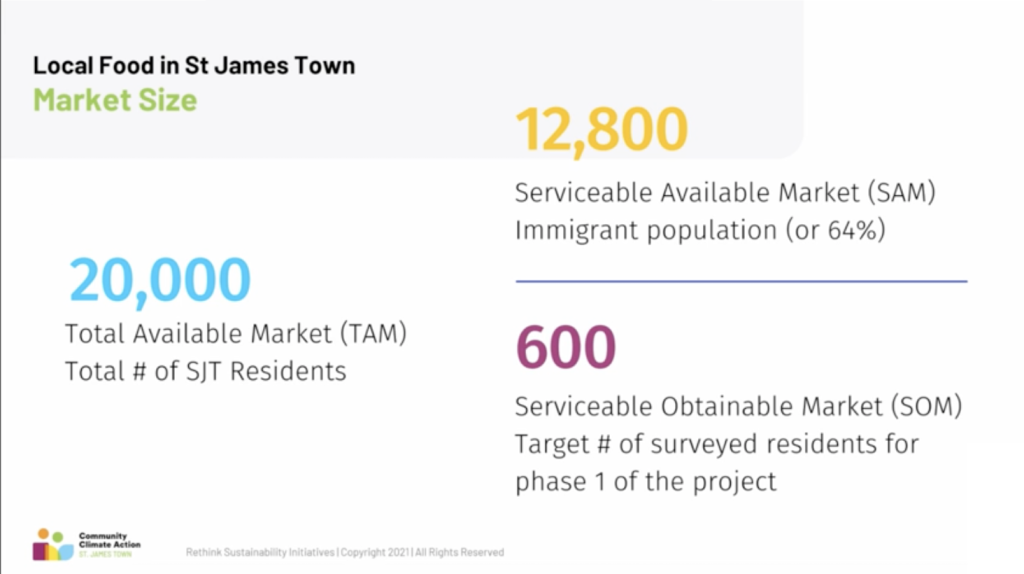
Selva laid out the one-year action plan in three, six and 12-month goals, centred around research in the community and food sellers. This foundational work can help develop a pilot program.
Workforce Development
Peer Leader, Michelle Clarke talked about untapped talent in St. James Town. There is a high poverty rate alongside a high education rate. Newcomers to Canada have additional challenges, but even those born and educated in Canada can still find it difficult to start careers. Many St. James Town residents are in “survival” jobs, with little support, time or opportunity to explore and grow careers.
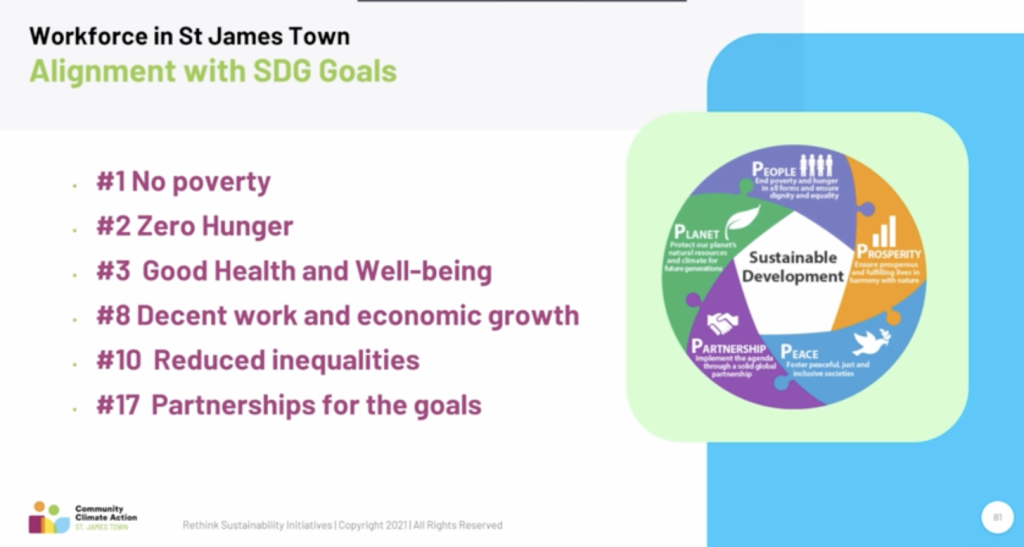
The top solution proposed is Mentoring Circles to provide peer support, relevant facilitators and job search coaching. The unique value proposition to this is bringing settlement support to the neighbourhood, allowing people to help themselves by helping others and building social capital. This use of untapped talent would help fill unmet needs and help bridge gaps and trust with conventional settlement services. Michelle presented benefits versus costs for implementing such a program, followed by how it aligns with Sustainability Development Goals.
Awards and Recognition
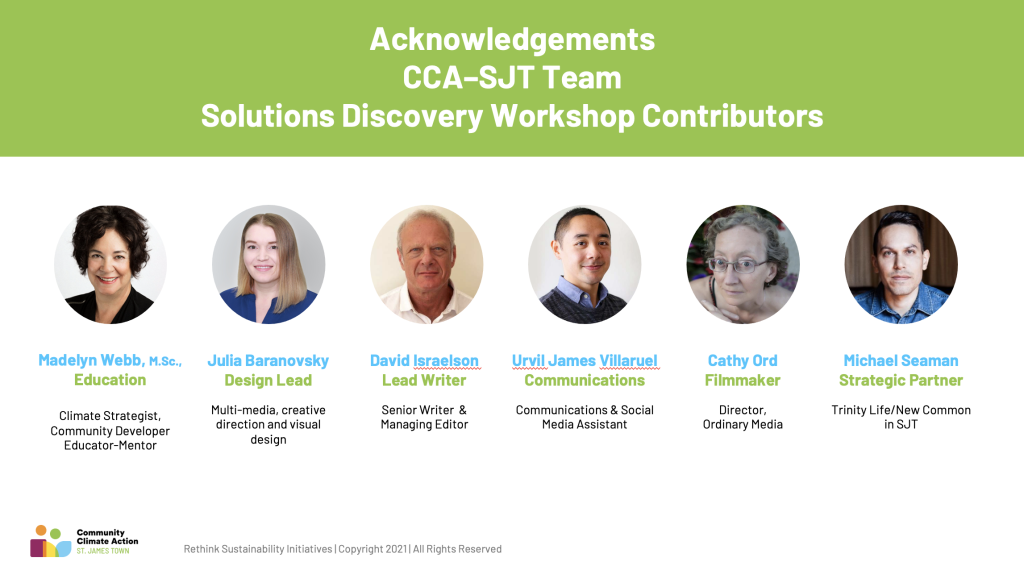
The hard work, dedication and visible strides towards sustainability in the SJT community from the Solutions Discovery Workshops are undeniable. RSI and Community Climate Action SJT want to thank and recognize everyone involved.
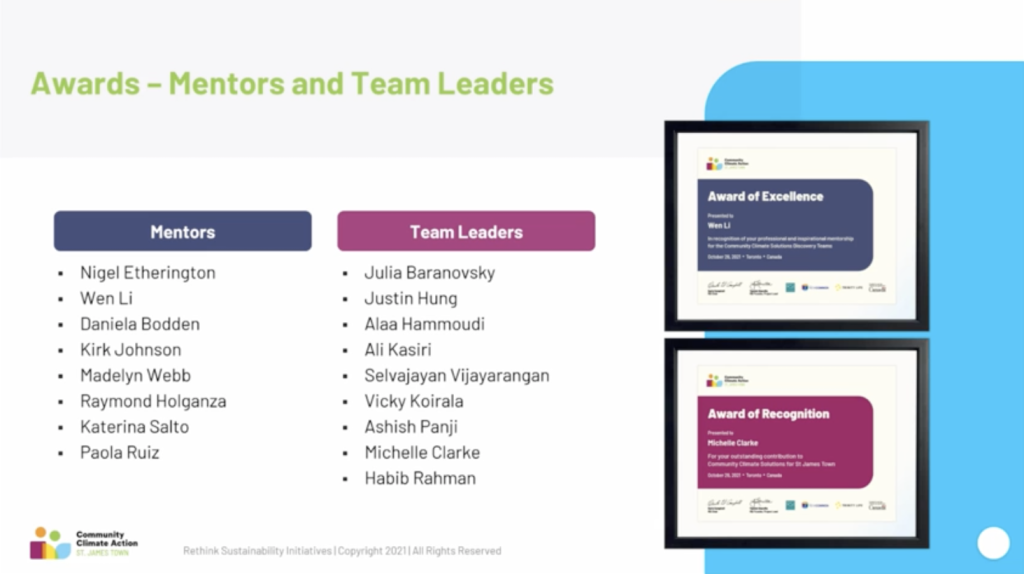
Certificates to honour all participants. Awards of excellence will be delivered to mentors and team leaders.
A big thank you to all workshop participants!

